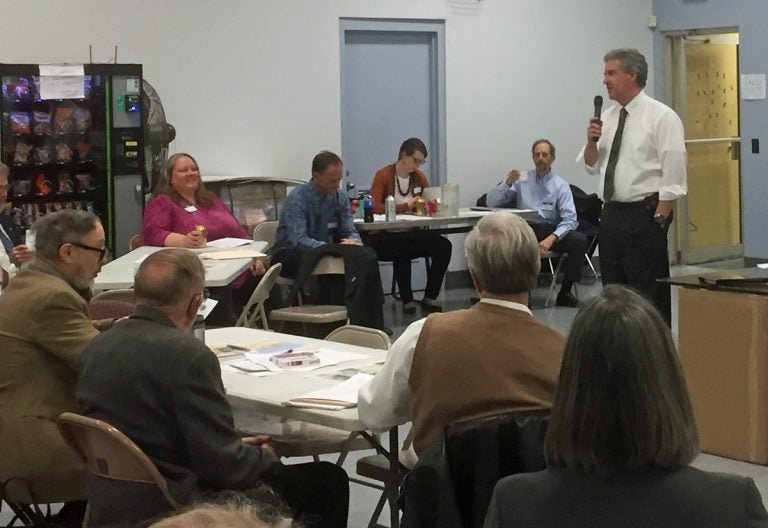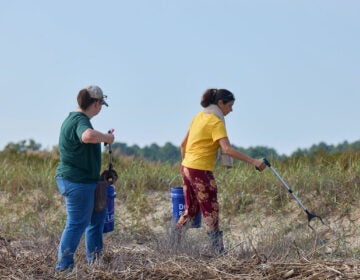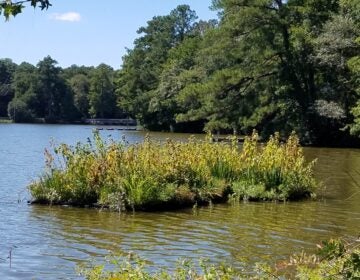Tension over already-signed Del. Coastal Zone Act legislation lingers
Delawareans gave their opinions on the CZA legislation at a public workshop.
Listen 1:36
DNREC Secretary Shawn Garvin speaks to concerned citizens at a public workshop about Coastal Zone Act regulations. (Zoe Read/WHYY)
Controversy continues to swirl around changes to Delaware’s Coastal Zone Act months after they were signed into law.
The CZA was created in 1971 to protect the Delaware Bay and the state’s shoreline from industrial development. In an attempt to make the state more business-friendly, the new legislation passed earlier this year directs the state Department of Natural Resources and Environmental Control to revamp the CZA and make way for the repurposing of abandoned industrial sites.
Before drafting the new regulations, DNREC is holding public workshops to get feedback from Delawareans.
At a workshop Wednesday night in Wilmington, it was clear efforts to change the CZA are still being met with resistance as opponents of the bill turned out to voice concerns about the transparency of the process, and the impact on public health.
“Yes, jobs are important, but I don’t want to die from it,” said community activist Penny Dryden to a crowd of a few dozen attendees.
The legislation, which had been in the works since 2014, creates a permitting process for the redevelopment of 14 industrial sites, including those that are abandoned or contaminated. It also allows new bulk product transfer operations at sites that had piers before 1971.
The original CZA prohibited the transfer of bulk goods by ship, and also placed restrictions on repurposing abandoned property for anything other than its previous use.
The new legislation still places restrictions on some heavy industry uses that didn’t exist four decades ago, such as oil refineries, steel mills, and liquefied natural gas terminals.
Companies seeking a conversion permit must submit an application detailing the environmental and economic impacts of previous uses and planned redevelopment of the site, a proposal to offset any negative environmental impacts of industrial redevelopment, and a plan to prepare the site for the long-term effects of sea-level rise.
While supporters of the bill argue the revamped CZA will create new jobs and boost the state’s economy, environmentalists say an increase of bulk product transfer could increase the number of hazardous spills.
At Wednesday night’s event, attendees continued to voice the same concerns raised to the general assembly earlier this year.
“Oil spills have been awful over the years, they’ve effected the river, they’ve killed all the fish, we’ve had oil at the bottom of our boats,” said Lisa Matthews with the Sailing Club.
Others are still disappointed about what they say was insufficient outreach to the community during the legislative process. Susan Mack suggested the committee advising officials on the new regulations should also include people who live near the 14 industrial sites — not just business and environmental leaders.
“I wish there were more public workshops before the legislation was passed,” Mack said to applause. “Not consulting the communities that live next to these sites before the statutes were passed is inexcusable in my mind.”
The regulatory advisory committee will continue to take public comments in the coming weeks and deliver a final report to DNREC by Christmas.
But attendees said the two-weeks’ notice for this week’s workshops was not sufficient, and expressed concern that the timeline to put together the first report does not allow for enough outreach.
“While I understand that the legislation does put forward a very ambitious schedule and timeline, to go back on what the department pledged to do and only allow limited public comment is a very dangerous precedent as we go into that regulatory process,” said Brenna Goggin with the Delaware Nature Society.
DNREC Secretary Shawn Garvin said the department would address the issue of timing and figure out the best way to reach out to the community.
Some attendees, such as Martin Willis, spoke out in favor of the CZA changes.
“I was more than ecstatic when the laws passed because it’s going to bring economic development with a balance of environmental regulations to the state of Delaware,” said Willis.
Angela Harris echoed his thoughts.
“Trying to clean up some of these areas and bring jobs back to the state is crucial,” she said. “I’m for the environment and keeping it safe, but let’s be honest, we haven’t been able to drink out of that water for years.
“But if we can develop some of those sites safely and provide a boost to the economy from the state, I’m all for it,” she added. “Leaving a filthy site and not being used — what benefit is that when you have an economy truly suffering in the state of Delaware? We should be thinking about the families living here and trying to provide for their families.”
DNREC has until October 2019 to create the new regulations.
Garvin said the new rules will be a combination of current regulations and new guidelines related to the impact of sea level rise and codified offsets, and that the purpose of this week’s workshops are to make the process as open and transparent as possible.
“[We want to] make sure we’re taking into account the community, the other stakeholders on what they would like to see with the process,” he said. “Ultimately, we have to put something together that works and makes sense, but even just tonight at this workshop, there’s a number of valuable things for us to consider.
“What I don’t want to do as we’re going through the process is continue to fight about the process, so we wanted to have these conversations up front so we could address as many of those things as we can.”
WHYY is your source for fact-based, in-depth journalism and information. As a nonprofit organization, we rely on financial support from readers like you. Please give today.





